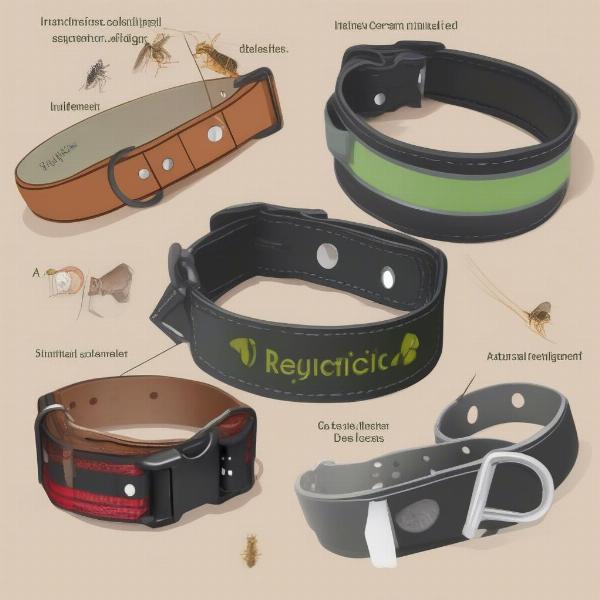Flea collars for dogs are a popular choice for pet owners seeking convenient and long-lasting protection against these pesky parasites. But with so many options available, choosing the right collar can be overwhelming. This guide will explore the different types of flea collars, their effectiveness, safety considerations, and how to choose the best one for your furry friend.
Understanding Flea Collars
Flea collars work by releasing active ingredients that either kill or repel fleas. These ingredients can be insecticides, insect growth regulators (IGRs), or natural repellents. Understanding how each type works is crucial for making an informed decision.
Types of Flea Collars
- Insecticide Collars: These collars contain insecticides that kill adult fleas and sometimes ticks. Some popular insecticides used include imidacloprid, fipronil, and permethrin.
- IGR Collars: These collars contain ingredients that disrupt the flea life cycle by preventing flea eggs and larvae from developing. Methoprene and pyriproxyfen are common IGRs.
- Natural Repellent Collars: These collars utilize natural ingredients like essential oils to repel fleas. Examples include citronella, geraniol, and peppermint oil.
 Different Types of Flea Collars
Different Types of Flea Collars
Choosing the Right Flea Collar for Your Dog
Selecting the right flea collar depends on several factors, including your dog’s age, size, breed, lifestyle, and the severity of the flea infestation.
Consider Your Dog’s Age and Health
Puppies and senior dogs may have more sensitive skin and may require collars specifically designed for them. Always consult your veterinarian before using a flea collar on a puppy or senior dog, or a dog with pre-existing health conditions.
Assess the Severity of the Flea Infestation
For severe infestations, a collar with a fast-acting insecticide may be necessary. For preventative measures, a natural repellent collar or an IGR collar might suffice.
Flea Collar Safety and Precautions
While flea collars are generally safe, it’s essential to follow the manufacturer’s instructions carefully and be aware of potential side effects.
Potential Side Effects
Some dogs may experience skin irritation, redness, or hair loss at the site of the collar. If you notice any of these symptoms, remove the collar immediately and consult your veterinarian.
Precautions
- Never use a cat flea collar on a dog, as some ingredients can be toxic to dogs.
- Avoid using multiple flea and tick products simultaneously, as this can increase the risk of adverse reactions.
- Monitor your dog for any unusual behavior after applying a flea collar.
Are Flea Collars Effective?
The effectiveness of a flea collar depends on the type of collar and the active ingredients. Insecticide collars tend to be the most effective at killing adult fleas, while IGR collars help prevent future infestations. Natural repellent collars may be less effective, particularly in areas with heavy flea infestations. seresto flea collars for dogs and natural flea collars for dogs offer varied levels of protection and should be chosen based on your individual needs.
Conclusion
Flea collars can be a valuable tool in protecting your dog from fleas. Choosing the right collar involves considering your dog’s individual needs and the severity of the flea infestation. Always prioritize your dog’s safety by following the manufacturer’s instructions and consulting your veterinarian if you have any concerns. natural flea and tick collar for dogs can offer a combined solution against multiple parasites. Remember, for comprehensive parasite protection, consider combining flea collars with other treatments like flea tick and worm treatment for dogs 3 monthly or specific tick treatment for dogs.
FAQ
- How long do flea collars typically last? Most flea collars provide protection for several months, but the exact duration varies depending on the brand and type of collar.
- Can I bathe my dog while wearing a flea collar? It depends on the specific collar. Consult the manufacturer’s instructions for guidance.
- Are flea collars safe for pregnant or nursing dogs? Consult your veterinarian before using a flea collar on a pregnant or nursing dog.
- What should I do if my dog has an allergic reaction to a flea collar? Remove the collar immediately and contact your veterinarian.
- Can flea collars prevent all flea infestations? While flea collars can significantly reduce the risk of flea infestations, they may not be 100% effective in all cases.
- Are there any natural alternatives to flea collars? Yes, there are natural flea repellents available, such as essential oil sprays and shampoos.
- Can I use a flea collar in conjunction with other flea treatments? Consult your veterinarian before combining flea treatments.
ILM Dog is a leading international pet care website dedicated to providing expert advice and resources on dog care and wellbeing. From breed selection and health care to training, nutrition, grooming, and product recommendations, ILM Dog offers a comprehensive platform for dog owners worldwide. We are committed to helping you provide the best possible care for your canine companion. Contact us today for expert advice! Email: [email protected], Phone: +44 20-3965-8624.